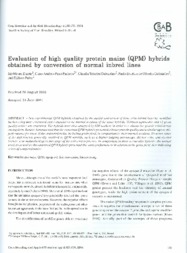Evaluation of high quality protein maize (QPM) hybrids obtained by conversion of normal inbred lines.
Evaluation of high quality protein maize (QPM) hybrids obtained by conversion of normal inbred lines.
Autoria: DUARTE, J. M.; PACHECO, C. A. P.; GUIMARAES, C. T.; GUIMARAES, P. E. de O.; PAIVA, E.
Resumo: Two experimental QPM hybrids obtained by lhe partial conversion of three elite inbred lines by modified backcrossing were evaluated and compared to the normal versions of the same hybrids. Thirteen agronomic and 12 grain quality traits were evaluated. The hybrids were also anaJyzed by SSR markers in order to evaluate the genetic relationship among them. Results demonstrated that the converted QPM hybrids presented a better protein quality and a similar agronomic performance for most of the evaluated traits, including grain yield, in comparison to their normal versions. However, some of the deficiencies generally ascribed to QPM hybrids, such as a higher lodgíng percentage, thicker cobs, and shorter kernels were maintained up to this stage of the conversion process. In comparison to more recent elite hybrids, the normal versions as well as the converted QPM hybrids presented the worst performances in relation to the grain yield, thus indicating a loss of competitiveness.
Ano de publicação: 2004
Tipo de publicação: Artigo de periódico
Unidade: Embrapa Milho e Sorgo
Palavras-chave: Line conversion, Opaque-2, QPM, backcrossing
Observações
1 - Por padrão são exibidas publicações dos últimos 20 anos. Para encontrar publicações mais antigas, configure o filtro ano de publicação, colocando o ano a partir do qual você deseja encontrar publicações. O filtro está na coluna da esquerda na busca acima.
2 - Para ler algumas publicações da Embrapa (apenas as que estão em formato ePub), é necessário ter, no celular ou computador, um desses softwares gratuitos. Sistemas Android: Google Play Livros; IOS: iBooks; Windows e Linux: software Calibre.
Acesse outras publicações
Acesse a Base de Dados da Pesquisa Agropecuária (BDPA) para consultar o acervo completo das bibliotecas da Embrapa.

